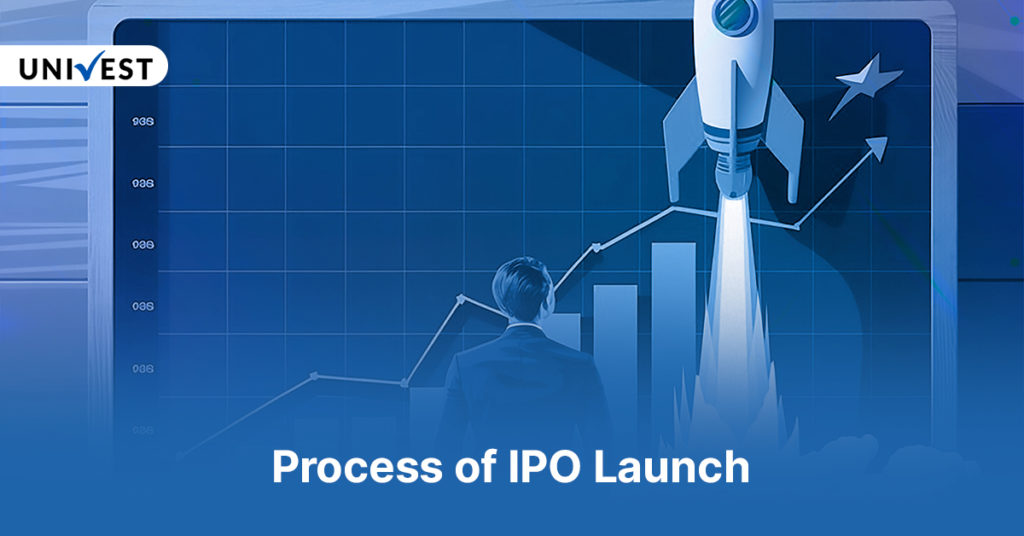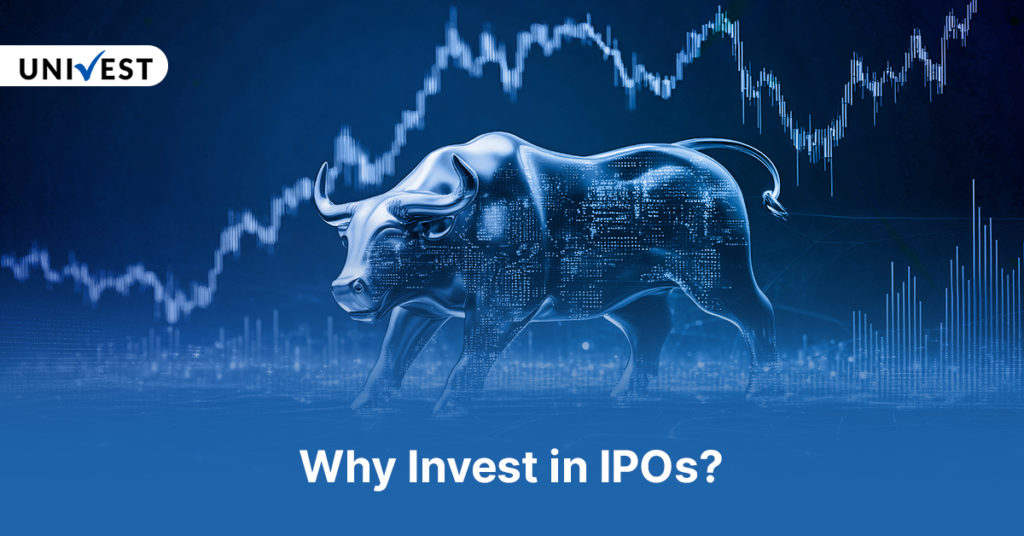
What is an IPO? Initial Public Offer
Posted by : sachet | Wed Jul 23 2025

IPO stands for Initial Public Offering, refers to the event in which private companies offer their shares to the public for the first time. It is one of the prominent ways to raise equity capital and transform a private company into a public company. With the help of an IPO, investors can earn healthy returns on their investments.
Not an overnight procedure; it takes months or years of planning for private companies to be listed on the stock exchanges as publicly traded organisations.
What is IPO in Stock Market?
An IPO in the stock market is an intuitive procedure for listing a private company on stock exchanges such as the BSE (Bombay Stock Exchange) and the NSE (National Stock Exchange). Once the IPO is complete, investors can trade in the shares of the companies.
One can directly apply for this offering through a demat account. However, it is essential to conduct thorough research on the upcoming IPOs, the company’s fundamentals, competitive position, prices, GMP of IPO, and much more. Explaining everything about initial public offerings in short phrases is not enough. Here is much more to learn.
Types of IPO
After discussing what is an IPO briefly, it is the right time to know about its types. IPOs (Initial Public Offerings) are further classified into two different categories. They include book-building offerings and fixed-price offerings.
- Book Building Offering
In the book-building type of IPO, the price can not be fixed for a share. The company or underwriter shares the price band on which investors are welcome to make a bid. This is an often-used pricing technique in an IPO (Initial Public Offering). Once the bidding ends, the organisation and investors set the final issue price using the weighted average method.
- Fixed Price Offering
Fixed-price Offerings (FPOs) represent IPOs with the issue price set by the companies for the sale of shares. When applying for an FPO, ensure that you pay the full fixed payment. The company tells investors about the prices when deciding to go public.
Process of IPO Launch

Going public is not a single-day procedure. It is something more than that. Let’s explore the whole procedure, which involves several steps.
- Select Underwriters
An underwriter can be a person or a company that assesses the financial risks and benefits of an IPO. When launching an IPO in the stock market, the company is to ensure the selection of investment banks or underwriters to manage the whole process. They are supposed to determine the timing, structure, and price of the launch.
- Fill Prospectus
To officially announce an IPO, private companies are required to file a registration statement called a “Prospectus” with the Securities and Exchange Commission. The prospectus may include financial details, risks, and business models.
- Meeting With Investors
Companies are required to conduct meetings with potential investors to increase awareness and demand for the IPO that will be launched. This could help them generate a higher subscription amount during the launch.
- Price Determination
After a successful launch, it is important to determine the price, which depends on several factors, including market conditions and the demand for IPO. In the step of price determination, investors come to know the total amount they have to pay for the shares of the company.
Note: The company can issue a price band in case of the book-building IPO method.
- Transfer of Shares
The last step for going public is transferring shares to the Demat account of investors. One can easily trade in shares available to the public on the NSE or BSE.
Advantages of IPO
Apart from the GMP of IPO and healthy returns, an Initial public offering comes with different benefits investors seek in the Indian stock market. Explore with us.
- Diversification
Becoming a listed company often provides opportunities to diversify business operations across sectors. An IPO invites hundreds or thousands of investors to become the company’s owners. As a result, the investment portfolio can be diversified to provide balanced returns.
- Recognition
Offering shares to the public for the first time could be a stepping stone to increasing a brand’s credibility. Companies can sustain a competitive edge in the market with the help of an IPO. Moreover, a successful public offering procedure could attract the attention of investors and other professionals to the organisation.
- Capital Appraisal
Despite taking debts on higher interest rates, companies prefer to raise capital through initial public offerings. We are already aware of the benefits of higher capital, such as better R&D, new hiring, paying off debts, and more. Hence, companies can increase their market capitalisation and growth perspective with the help of IPOs.
- New Minds
Different people could have different opinions. And inviting new investors to become the company owners could bring new ideas for business development. Therefore, going public could encompass the company’s capabilities to improve business mode, market tactics, and more.
Disadvantages of IPO
IPOs are good for investors and businesses. However, they also come with some practical consequences that an organisation has to face. Companies should be prepared for these to eliminate any risk of uncertainty.
- High Pressure
Compared to private companies, publicly traded companies face enormous pressure to maintain the high value of their shares. Extra pressure on management and other professionals might impact the productivity of the company. Thus, a company must launch an IPO with proper planning and acquisition.
- High Cost
Launching an IPO could be costly. Companies might have to pay the continuous cost of regulatory compliance. In addition, they have to bear the cost of underwriters and another investment bank to ensure a successful launch.
Why Company Go Public?

Money is the backbone of every business’s growth in the competitive business environment. As discussed earlier, an IPO is one of the best ways to raise capital and funds from the market. Businesses can use this funding for several activities, such as repaying loans, building infrastructure, and improving their financial figures.
Business professionals know that going public could help a firm gain brand recognition and market success. Trading stocks in the open market means higher liquidity. It opens the door to employee stock ownership plans like stock options and other compensation plans, which attracts the talents in the cream layer. In a demanding market, a public company can always issue more stocks. This will pave the way to acquisitions and mergers as the stocks can be issued as part of the deal.
How to Invest in IPOs?
To invest in an IPO, consider the steps mentioned below.
- Conduct Research
Research should be the first step for investors in the stock market. Thus, it can also be used in an IPO (initial public offering). Know about the current/upcoming IPOs and the company’s fundamentals to assess its growth prospects. One can also check for the GMP of IPO to analyse the expected return when listing. Consider pre-issue PE ratio and post-issue PE ratio as the key indicators to identify the best IPO.
- Open Demat Account
Register with a broker and open a demat account to bid for an IPO lot. Register with a broker and open a demat account to bid for an IPO lot. With each account, investors can apply for different IPOs, including multiple lots. Consider making a demat account on an authentic and recognised platform to make your investment journey easier and more flexible.
- Select the Lots
Select the number of lots you want to apply for an IPO. Investing in public offerings can be risky. Investing the amount you can afford to lose is essential, specifically in the volatile market.
- Pay and Place Order
Different brokers have different policies and procedures. Some allow investors to place orders for IPOs before the official launch, while others require investors to wait for the stock to be listed on the NSE and BSE. After selecting the quantity you wish to buy, pay, or mandate the amount with an authorised payment mode, the company will confirm the payment only if you have the shares allotted.
- Check Allotment Status
Checking for IPO allotment status is easy. Visit the official website of the NSE (National Stock Exchange) at https://www.nseindia.com/products/dynaContent/equities/ipos/ipo_login.jsp. Register and fill in the required details, like the IPO application number, to check the allotment status online.
- Check Portfolio
Track the returns in your portfolio to identify the best profit booking position. Monitoring the shares is important if you plan to hold them for a longer time.
Check for the upcoming IPO now and properly research and analyse fundamentals like PE ratio, PB ratio, and Dividend Yield to earn higher returns.
Why Invest in IPOs?

Investing in an IPO comes with multiple risks but can also offer potential benefits to the investors. Let’s explore why investors should consider IPOs as the potential and safe way to generate higher returns.
- Transparency: When going public, companies know that they have to follow strict regulatory standards, including financial transparency. Investors are supposed to get a detailed prospectus consisting of the company’s insights on financial performance, risks, and growth strategies. The next level of transparency could be a stepping stone for investors to optimally research IPOs to analyse their potential to deliver returns in future prospects. As an investor, you can enjoy the transparency of the company and assess its financial and fundamental details from the prospects.
- GMP: Before it officially hits the stock exchange, an IPO trades in the grey market (unofficially). The GMP (Grey Market Premium) is the difference between the grey market price and the expected listing price of an IPO share. When a high GMP shows robust demand for the stock, it can lead to a positive listing. A solid Grey Market Premium can be an indication of strong market interest as well as possible profit-making for investors.
- High Returns: One of the main attractions of IPO investing is its potential for generating high returns. Newly listed stocks usually have a significant price increase once they trade. This occurrence, referred to as a “pop,” takes place when the stock price rises significantly on its first trading day. If you get in at the outset, it can lead to considerable short-term profits. For instance, numerous technology firms have experienced significant increases in their stock prices following their IPOs, offering early investors impressive returns.
- Accessibility to Growing Firm: IPO investment allows individual investors to gain early entry into a new and growing firm that is listed on the stock exchange with a higher potential to deliver returns. IPOs with robust growth prospects across industries such as technology, healthcare, green energy, and more are considered. An IPO poised for rapid growth in the stock market can give investors opportunities to generate healthy returns and build their wealth in the long term. Taking entry from the early stage could be a smart move to generate returns on the investments.
Terms Related to IPO
Before applying for an IPO, ensure that you have a proper understanding of what is an IPO and its terms. Here are some common terms in IPOs.
- Under subscription: The concept indicates that the number of shares applied for is less than the number offered to the public.
- Oversubscription: This means that an excess of applications have been received for the shares offered to the public, and there are fewer shares to meet this aggressive demand.
- Underwriter: An individual, financial institution, or banker assists companies in getting their IPO fully subscribed and managing the launch smoothly.
- DRHP: A Draft Red Herring Prospectus (DRHP) or prospectus is a document signed by the business enterprise to the Securities Exchange Board of India (SEBI) to issue an IPO in the Indian stock market.
- Price Band: It is the range of prices offered to investors to make a bidding when applying for the shares. The issuer/company or underwriter prescribes the price band to raise the capital for business expansion.
- Flipping: It is the process of earning a quick profit in which investors sell the allotted shares in the first few days of listing.
- GMP of IPO: The Grey Market Premium, or GMP of IPO, is the percentage difference between the current value of shares in the grey market and the issue price prescribed by the company launching the IPO.
- Allotment Status: IPO allotment status offers information about the total number of shares allotted to investors for their applications received during the IPO launch. One can easily check the allotment status through the official website of the NSE (National Stock Exchange).
Invest in IPO With the Univest

Some IPOs could bring multibagger stocks into the picture. An accurate stock recommendation could help you earn higher returns from stocks, IPOs, and commodities. Univest is the best stock advisory company that helps investors with their research and analysis of current and upcoming IPOs. You can check the date, real-time GMP of IPO, allotment, and other details about the offering on the Univest app for absolutely free.
Thumbs on the right platform could help you invest safely and avoid losing money in the Indian stock market. Download the app now to enjoy free screeners, live charts, price details, and GMPs!
Also, use the Univest Android app or the Univest iOS app to have real-time insights/verdicts on current and upcoming IPOs.
Key Takeaways
- IPO is the event in which a private company offers its shares to the public for the first time.
- It is essential to hire investment banks or underwriters to determine the price and demand for the successful launch of an IPO.
- Investors can apply for a number of lots in an IPO with a single demat account.
- Every company’s primary purpose in issuing an IPO is to raise capital for business expansion in different areas.
- Applying for IPOs might come with risk, but it can also provide investors with several benefits, such as access to new ventures, higher returns, and portfolio diversification.
- If you are scrolling to learn about multibagger stocks for next 5 years, we would like to suggest you learn about the IPO’s potential.
FAQs
- How to check IPO allotment status?
Ans. To check the IPO allotment status, visit the official NSE website and select the company from the drop-down menu. Fill in the details, including PAN (Permanent Account Number), IPO application number, or DP client ID.
- What is an IPO?
Ans. IPO or initial public offering is the journey of private companies to become publicly listed organisations by issuing their shares to the public for the first time. Companies engage with investment banks or underwriters to launch their IPOs successfully with an effective subscription level.
- Is investing in an IPO worth it?
Ans. Yes, one can get higher returns by subscribing to current and upcoming IPOs. Taking entry on the ground base of a share showcasing robust growth potential can help you build wealth in the Indian stock market. You can easily invest in IPOs with your demat account and appreciate your capital over time.
- How can I apply for the IPO?
Ans. Applying for an IPO is simple. Investors should consider multiple steps, including research, choosing the number of lots, placing an order, checking IPO allotment status, and tracking portfolios. Allottees can sell the shares received in the IPO from the pre-market session on the day of listing.
- How to get an IPO allotment?
Ans. There is not a guaranteed way to get a 100% IPO allotment. But yes, there are some ways to increase the chances of allotment. These include.
- Apply as early as possible to become a firstcomer and prioritise investor.
- Ask your family members or friends to apply on your behalf to increase the allotment chances.
- Try applying for limited lots so you do not miss a few quantities left to be allotted.
- Buy the shares of the parent company if they are already listed on the stock exchange. It will increase the chances of allotment.
- Verify the details while applying for the IPO of the company to not be disqualified.
- Why do companies launch IPOs?
Ans. The primary aim of every company to bring an IPO is to raise capital from the market at the lowest cost. However, apart from raising capital, private companies can get several other benefits from an IPO, such as expansion, diversification, recognition, and more.
Read Other Popular Articles from Univest
Best Multibagger Stocks For Next 5 Years in India
FMCG Sector Stocks to Invest in India
Best Fundamentally Strong Stocks For Long Term
Top Green Energy Stocks in Buy In 2025
Fundamentally Strong Stocks In BSE
Solar Penny Stocks in India 2025
Top 10 Fundamentally Strong Penny Shares to Buy in 2025
Explore Current and Previous IPOs
| Company | Opening Date | Closing Date |
| Chandan Healthcare Limited | 10th February 2025 | 12th February 2025 |
| Ajax Engineering Limited | 10th February 2025 | 12th February 2025 |
| Eleganz Interiors Limited | 7th February 2025 | 11th February 2025 |
| Readymix Construction Machinery Limited | 6th February 2025 | 10th February 2025 |
| Solarium Green Energy Limited | 6th February 2025 | 10th February 2025 |
| Amwill Healthcare Limited | 5th February 2025 | 7th February 2025 |
| Ken Enterprises Limited | 5th February 2025 | 7th February 2025 |
| Chamunda Electricals Limited | 4th February 2025 | 6th February 2025 |
| Malpani Pipes and Fitting Ltd. | 29th January 2025 | 31st January 2025 |
Univest Screeners
52-Week Low Stocks Today
| Stocks | LTP (₹) | New Low (₹) |
| AGS Transact Technologies Limited | 43.22 | 43.22 |
| AMD Industries Limited | 55.00 | 50.31 |
| Ankit Metal & Power Limited | 3.00 | 3.00 |
| Arrowhead Seperation Engineering Limited | 113.85 | 113.85 |
| Baazar Style Retail Limited | 256.45 | 255.10 |
52 Week High Stocks Today
| Stocks | LTP (₹) | New High (₹) |
| Aarti Pharmalabs Ltd. | 679.95 | 747.15 |
| Aeroflex Industries Ltd. | 259.87 | 272.00 |
| ARUNIS ABODE Ltd. | 171.85 | 171.85 |
| Bajaj Finance Ltd. | 8,507.30 | 8,662.80 |
| Bajaj Healthcare Ltd. | 696.70 | 719.00 |
*Data is updated as of 6th January 2025

